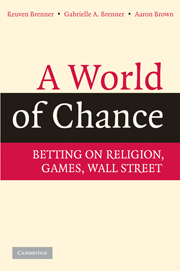Book contents
- Frontmatter
- Contents
- Preface
- Acknowledgments
- 1 From Religion to Risk Management: What to Do When Facing Uncertainty?
- 2 Anything Wrong with Gambling as a Pastime?
- 3 Are You Rich? Risk-Taking and Gambling, or the Leapfrogging Instinct
- 4 Betting on Futures and Creating Prices
- 5 Gambling as Banking: Poker, Junk Bonds, and Central Banks
- 6 Lottery Is a Taxation, and Heav'n Be Prais'd, It Is Easily Rais'd
- 7 Politics and Prohibitions; or, What's a Good Tax Anyway?
- 8 How Gamblers and Risk-Takers Correct the Future
- Appendix 1 Gambling and Risk-Taking: The Leapfrogging Instinct
- Appendix 2 Human Nature and the Civilizing Process
- Appendix 3 A Statistical Profile of Gamblers
- Notes
- Bibliography
- Name Index
- Subject Index
7 - Politics and Prohibitions; or, What's a Good Tax Anyway?
Published online by Cambridge University Press: 06 July 2010
- Frontmatter
- Contents
- Preface
- Acknowledgments
- 1 From Religion to Risk Management: What to Do When Facing Uncertainty?
- 2 Anything Wrong with Gambling as a Pastime?
- 3 Are You Rich? Risk-Taking and Gambling, or the Leapfrogging Instinct
- 4 Betting on Futures and Creating Prices
- 5 Gambling as Banking: Poker, Junk Bonds, and Central Banks
- 6 Lottery Is a Taxation, and Heav'n Be Prais'd, It Is Easily Rais'd
- 7 Politics and Prohibitions; or, What's a Good Tax Anyway?
- 8 How Gamblers and Risk-Takers Correct the Future
- Appendix 1 Gambling and Risk-Taking: The Leapfrogging Instinct
- Appendix 2 Human Nature and the Civilizing Process
- Appendix 3 A Statistical Profile of Gamblers
- Notes
- Bibliography
- Name Index
- Subject Index
Summary
Which shows why prohibitions on gambling have been wrongheaded, often serving narrow political interests, their effect at all times in all countries having been the creation of extensive black markets rather than withdrawal from betting.
By the twentieth century, old theories blaming poverty on poor people's propensity to gamble and drink and on gambling violating the law of labor disappeared from both academic and political vocabularies. But it did not take long for new well-intentioned but inaccurate arguments against gambling to emerge. Some of these new vocabularies and models suggested what other jargons and models had suggested before: that gambling should either be prohibited or be a government monopoly both to prevent too much vice, fraud, corruption, and involvement of criminal elements and to control the populace's occasional irrational urges to gamble.
Other models have condemned government monopolies of lotteries or casinos, though without drawing the arguments to the logical conclusion or providing any alternatives. They condemned lotteries and some forms of gambling not on the grounds that monopoly rents could be spent on bribes or that monopoly prevents the development of a wide variety of innovative financial instruments and innovative betting markets. Instead, they stated that lotteries are both a regressive tax and a nontransparent one.
- Type
- Chapter
- Information
- A World of ChanceBetting on Religion, Games, Wall Street, pp. 150 - 193Publisher: Cambridge University PressPrint publication year: 2008



